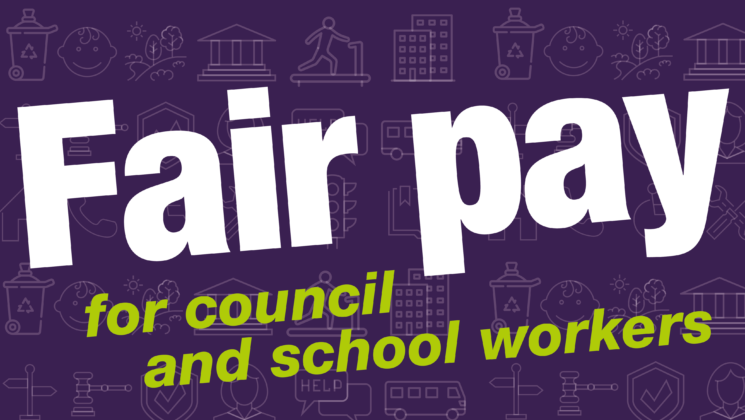The heroic sacrifice of NHS workers has never been far from the headlines during the COVID-19 pandemic – and rightly so.
And while health workers have pulled out all the stops to keep the country going, a forgotten frontline of less visible local service workers have been tirelessly supporting schools, providing cleaning and administrative services, and caring for the elderly.
These workers were underpaid and undervalued long before the pandemic hit, yet put themselves in harm’s way to help the most vulnerable in our communities.
Georgia Richardson is a registration officer for Manchester City Council. It’s her job to register all births, deaths, marriages and citizenships. A pay rise would make a huge difference to her life.
“Local government workers have been through the mill this year,” she says.
“Everybody’s pulled together with a community spirit, making sacrifices for more vulnerable people and doing our bit to get infections and deaths down.
“And we do our jobs with pride because it’s the moral thing to do. With that in mind, a pay rise would be a symbol of appreciation for everything we’ve done.
“But it’s also that people need a pay rise regardless of the pandemic – inflation affects everyone and life isn’t getting any cheaper.”
Georgia has given everything she can to do her job well over the past year. “My job has been knackering through the pandemic – especially with registering all the deaths”.
While she notes that she’s used to doing the job, and knows that she’s helping people go further along in their grieving processes because they can’t have a funeral without the paperwork, “but it’s been so traumatic over the past year.
“Before the pandemic hit, we were working as close to capacity as possible, but now it’s just gone off the scale. We’ve had to adjust to new ways of working, and every time there’s been a change in the lockdown rules and protocols, our heads have been spinning.
“From moving the service online to doing death registrations over the phone, to postponing people’s marriages and registering new ones, whilst also dealing with a computer system that keeps crashing and making sure the office is repeatedly being disinfected, it’s been crazy. It has been stressful through the pandemic, and continues to be stressful.”
A minimum of £10 an hour
Since 2010, public sector workers have been subjected to repeated pay freezes and cuts. Meanwhile, year on year, the cost of living and housing has risen exponentially. Currently, over one in 10 (16%) of local government workers don’t earn £10 an hour. With a 10% pay rise for all, every single council and school worker would earn a real living wage.
Paul Nuttal is a caretaking and cleaning coordinator for Bury Council, where cleaners get £9.25 an hour, and caretakers get £9.97. Considering the pandemic, he says that his team deserves a pay rise more than anyone.
“We cover 80 buildings, with 280 staff. That includes over 50 schools in the borough. Our staff have been on the frontline and at the centre of the pandemic, doing everything they can, right the way through. Yet cleaners go under the radar and just don’t get the recognition that they deserve.”
Paul has worked for the council for 12 years and sees central government funding at the root of the problem: “I’m sure the council would love to give everyone a pay rise, but there’s just no money from central government.
“Two years ago, the government announced a 2% pay rise for local government staff, but didn’t give councils any extra funding for it. So councils are even more squeezed, while the government gets a pat on the back. At the root of the whole problem is the government cuts to local council funding.”
He says that the bare minimum should be “a pay rise that’s in line with inflation. The cost of living is going up. Water, gas, electricity and broadband are all going up year on year, but wages are stagnating. It’s a double whammy”.
Feeling forgotten
James Mack is responsible for the premises and maintenance for a school in Leicestershire. He’s been taking on totally new work to get his school ready for reopening. Though it’s work he was happy to do, he now feels cast aside.
“We put up all the testing booths and built all the shields for social distancing, and we had to source new materials when it was tricky to get them. We were setting up all the classrooms and took on a lot more than we usually would, because everything depended on us.
“But now I just feel used. We’ve gone from basically being the most important to feeling forgotten.
“I earn £1,400 a month, which supports both me and my wife. A pay rise would mean not having to think about the little stuff. It means we could buy food we actually like, rather than thinking ‘oh no, chicken’s gone up, can’t have that’. It means when you have somewhere to go, not worrying about putting petrol in the car.”
After years of pay freezes and real term pay cuts, 25% has been wiped from the value of local government pay since 2010.
Sheila Smith* is a business partner for schools in the north of England, where it’s her role to support 76 schools to access funding. Through the pandemic, she’s worked extremely hard to make sure that schools in her area can access the COVID-19 grants that have been made available, and make use of what’s been directly allocated.
She supports a 10% increase for public sector workers.
“I’ve worked in finance for 25 years, and I’ve seen an erosion of my pay over this time. I work in the public sector because I believe in working for the public sector, but I don’t think I’m well compensated for what I do. A pay rise would be a recognition of the important work that we all do.”
She describes her work. “When schools closed last year, it was up to me to coordinate all of the refunds for prepaid school meals and school trips, and right now, I’m coordinating free school meal vouchers and food parcels for children over the summer.
“I’ve also supported schools to get more funding, access COVID-19 grants and deal with the paperwork and restrictions around those grants to ensure schools are compliant and can access the money. I work around 45 hours a week.”
Sheila says she does her job because she loves it and feels she can make a difference to schools and the children in them, but she doesn’t feel recognised for what she does.
“Life isn’t getting cheaper,” she observes. “I totally appreciate there are lots of people in worse off situations than I am, but this is my fourth year without a holiday. My team and I work incredibly hard, and there’s sometimes a lack of appreciation for all the extra hours that we put in. It’s those of us in the back office who enable the frontline to function, and we’ve all gone above and beyond.”
A 10% pay increase for local government workers would cost less than the £37 billion spent on the failed track and trace system, and the estimated £849 million spent on the ‘eat out to help out’ scheme.
Find out more about the campaign here
*Name has been changed at the member’s request, to protect their identity.





